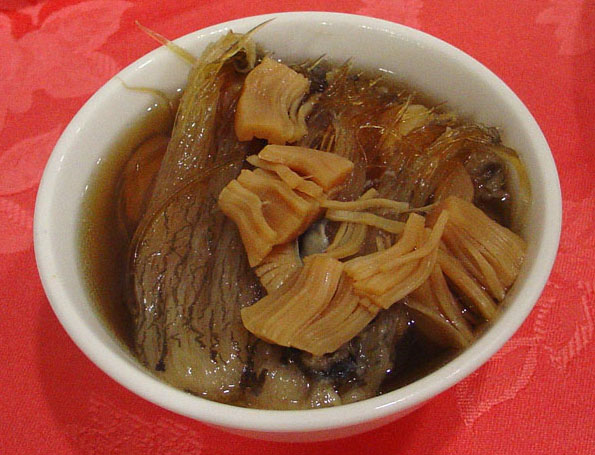Facts About Buddha Jumps Over the Wall
"Buddha Jumps Over the Wall" also known as "Buddha's Temptation" is a celebrated dish from Fujian cuisine with origins dating back to the Qing dynasty. Renowned for its intricate preparation and enticing aroma, this luxurious shark fin soup is famous for its ability to tempt even vegetarian monks. Rich in protein and calcium, the dish symbolizes culinary indulgence.
However, the inclusion of shark fin and abalone has generated significant concerns regarding sustainability and animal welfare. Harmful practices like shark finning and destructive fishing methods have led to regulations limiting the consumption and accessibility of this delicacy.
The dish features a sophisticated blend of ingredients, including quail eggs, bamboo shoots, scallops, sea cucumber, abalone, shark fin, fish maw, chicken, Jinhua ham, pork tendon, ginseng, mushrooms, and taro, among others. Some recipes call for as many as thirty primary ingredients and twelve condiments, making it a true culinary masterpiece.
One popular origin story of "Buddha Jumps Over the Wall" involves a scholar traveling with friends during the Qing dynasty. While cooking the dish in Fuzhou, its tantalizing aroma reached a nearby monastery, causing a monk to break his vegetarian vows to sample the soup.
The dish has also achieved recognition outside of China. In South Korea, it is known as "Buldojang" and was introduced in 1987 by a Taiwanese chef. Initially met with resistance due to its controversial name, the dish eventually gained popularity and was even served at a state dinner for President Moon Jae-in during his visit to China.
In London, the esteemed restaurant Kai Mayfair offered an opulent version of "Buddha Jumps Over the Wall" in 2005, priced at £108, earning it the title of the world's most expensive soup. This luxurious rendition included premium ingredients such as shark's fin, Japanese flower mushroom, sea cucumber, dried scallops, chicken, Hunan ham, pork, and ginseng.
"Buddha Jumps Over the Wall" remains a testament to the rich culinary heritage of Fujian cuisine, blending history, culture, and an array of exquisite flavors into one unforgettable dish.
